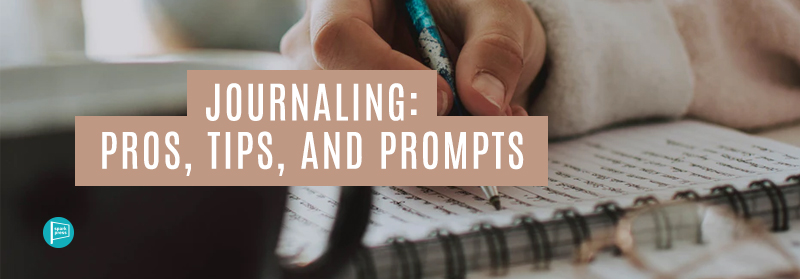
Journaling has become one of the most popular forms of writing. In the simplest of terms, journaling is writing down your thoughts and feelings. A lot of counselors recommend it, even fellow writers, because it is a way to see what’s going on in your mind, to see it, and understand it.
Journaling has so many benefits and helps aid in reaching certain goals, personal and career-wise. Not only can it help boost your mood but it has been proven to help reduce symptoms of anxiety disorders and depression.
So how can journaling help you in your everyday life and as a writer?
Journaling for You
When you are able to clear your mind and visualize what you are thinking on a physical page, the easier it becomes to gain perspective. Journaling allows you to stay self-aware, while also letting you reflect on whatever may be disturbing your subconscious. It can also be an amazingly private experience. You have a space that is completely personal to you, one that is free of other’s opinions and distractions. It is also an independent venture, you can choose what to write about. You can find prompts that allow you to dive deeper into thought, or freestyle it. No matter how you choose to write, the experience itself has proved to boost your mood and increase serenity in your life.
Even if you’re journaling about future dreams or the adventure you’re currently on, seeing it in the physical world can do wonders.
Journaling for Writers
As writers, we have thousands of thoughts on a daily basis—about character development to new ideas and inspirations to edits on that chapter you’re working on. Sometimes it can get a little chaotic up there; totally understandable. A way to keep everything together, or at least try to organize it a little, is by journaling. It can be a helpful tool for writer’s block, keep your mind in peak condition, boost your memory, and even help the brain regulate emotions, according to positivepsychology.com. See it as connecting you to your inner intentions and desires while also remaining present in your own work to keep perspective on the subjects you’re writing about.
You have the ability to clear out all the distractions that keep you from writing what you really want, and at the same time, you might even find whatever you journal about is something you can write about. There are plenty of people in the world who find themselves publishing their personal journals and they become best-selling memoirs.
How do You Start Journaling?
The good news is you can start journaling as soon as you’re done reading this! There’s no training that you need. There is no package deal that you have to buy. You are already fully equipped to start turning your thoughts into reality. But here are some tips to help you get started:
- Make time once a week, once a day, or whenever fits your schedule best, to be by yourself. Taking yourself away from the distractions of the world is the whole point. This is a uniquely personal habit, so make it your own.
- There is no “right” way to journal. Write however you like, there is no need for APA or MLA format in this case. Write however feels right to you and your thoughts.
- Reflect after writing. Your thoughts are important and there’s a reason you’re thinking them and wrote them down. Take them into consideration.
Even better, if you are really stuck in that writer’s block there is no need to fear. You can find prompts from a lot of different sources like Pinterest, and even here with the list below!
- Gratitude: What are some things in your life that you are grateful for? Are there any events that have happened in your life recently that you’re grateful for?
- Affirmations: Those really great things about you, yeah write about those. Write down how beautiful you are, how strong and smart you are, how amazing it is that you are on this earth and how the world is just waiting to encounter the spectacular things you are doing and will continue to do.
- Anxiety: If your mind is just reeling with thousands of thoughts and you can’t seem to sort out the optimistic ones from the not-so-great ones, write them down. We usually feel anxious from the unknown, from those irrational and rational fears, so write them down and it may even help you get to the root of where they’re coming from
- Playlist: Write down something as simple as your favorite songs. Maybe write down what those songs remind you of or where those songs take you.
- Future: Write down what you want to accomplish, the places you want to go, the people you want to meet. Write down everything you dream of and aspire to be. Manifest those things onto the page.

Leave A Comment